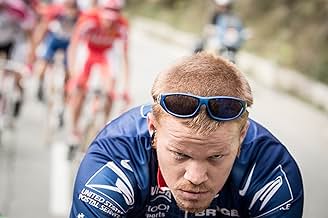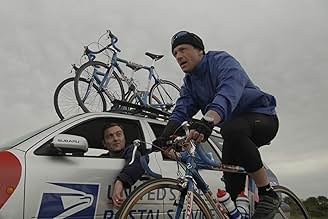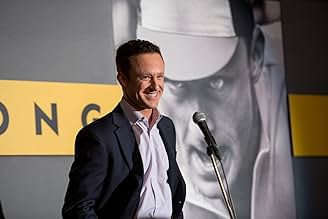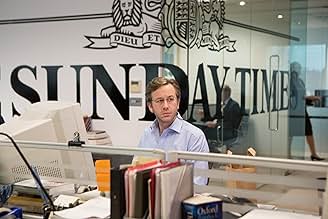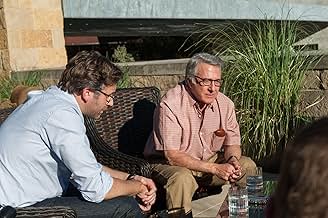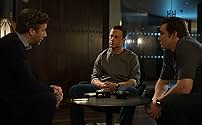CALIFICACIÓN DE IMDb
6.5/10
20 k
TU CALIFICACIÓN
Un periodista deportivo irlandés está convencido de que las victorias de Lance Armstrong del Tour de Francia se deben a sustancias prohibidas. Con esta convicción, comienza a buscar evidenci... Leer todoUn periodista deportivo irlandés está convencido de que las victorias de Lance Armstrong del Tour de Francia se deben a sustancias prohibidas. Con esta convicción, comienza a buscar evidencia que exponga a Armstrong.Un periodista deportivo irlandés está convencido de que las victorias de Lance Armstrong del Tour de Francia se deben a sustancias prohibidas. Con esta convicción, comienza a buscar evidencia que exponga a Armstrong.
- Dirección
- Guionistas
- Todo el elenco y el equipo
- Producción, taquilla y más en IMDbPro
Opiniones destacadas
On paper, the life of Lance Armstrong lends itself to a cinematic interpretation quite nicely, but The Program, Stephen Frears' restless, showy Armstrong biopic, feels undercooked and premature. Though Ben Foster's Armstrong jokes about Hollywood's plan for a movie about his life (complete with smirky mispronunciations of Jake Gyllenhaal), his against-the-odds underdog tale was never going to be the more compelling film compared to the true story. It's a small mystery as to why Frears decides to play the first half hour of The Program in such a headspace, urging us to cheer for an idealized version of the famed cyclist despite the inevitable mess that awaits us just around the corner. Such an unnecessary sprawl as we turn through a run-of-the-mill rise-through-the-ranks before the downfall is unkind to detail; instead, it feels like a compromise to make the whole thing go down easier for those unaware of the controversy, and thus the film is probably not quite as invested in the scandals in the first place.
Though The Program is clumsy in its execution and handling of loaded material, it nails its depiction of key moral dilemmas surrounding not just Armstrong's doping scandal that eventually stripped him of his professional accolades–including his seven Tour de France titles– but also effectively ended his athletic career with a worldwide ban from most competitive sports. If Chris O'Dowd's journalist, David Walsh, takes down Lance Armstrong, which he spends the majority of the film trying to do, he's taking down not only massive and respectable cancer charities associated with Armstrong, but also the integrity of the sport itself. The film acknowledges that most cyclists were doping at the time, but it tries to shave down its theme to that point while ignoring juicier social commentary regarding our misguided hero worship culture and how we react to the controversies. There's a lot of meat to chew on that remains untouched on the plate, but perhaps Frears already felt his hands full up with a narrative that's far more focused on the interplay between Armstrong and the man determined to expose his skeletons.
As Armstrong, Foster has the drive, the resemblance, and he can balance light and dark in a way that fits the conflicted tone of the man in reality and the fictionalized version of him. It's a shame, for the most part, that Foster tries too hard for too little payoff, almost desperately searching for Oscar clips, but it's John Hodge's screenplay that ultimately lets him down hard, indulging in trite lines that stick out. In a sense, it fits the Armstrong mantra to be over- rehearsed and only approaching an aura of naturalness, though it doesn't work for Foster. His performance here is similar to Anne Hathaway's in Les Miserables, but he's rarely offered the emotional potency to justify his tone. It's still good work, he's just operating on a different gear to everyone else when he should be leading the pack. While the tone of the film feels like easy resort, at the very least it does a good job of showing the gravity of Armstrong's actions and the gravity of Walsh's accusations.
While Foster may falter, The Program boasts a strong ensemble overall, which also includes Dustin Hoffman, Lee Pace, and Jesse Plemons. O'Dowd made his name in the tongue-in-cheek TV riot The IT Crowd, but he's hard to take seriously in dramas or comedies in both America or Britain. He consistently feels like a novelty more than a talent. Here, he's toe-to-toe with Foster and showing his dramatic potential. While he has one note to play (determined exasperation), he plays it well and pleasantly engages us. Plemons has another underused snitch role to play (to reference his brief turn in Black Mass this year) and brings that same quiet menace that made his Todd on Breaking Bad so magnetic. It's also nice to see Denis Menochet, most memorable in the opening of Inglourious Basterds, to have a meatier role spread across an entire film here as Armstrong's trainer.
Despite its shortcomings, The Program is still largely entertaining, if not enthralling, which it earnestly tries to be. The whiplash editing of its various race sequences would have worked had the film itself been gunning for a darker subtext, but they're left to hang on the screen and thrill in the moment. The film's lowest point, however, is its on-the-nose rota of soundtrack choices. It feels too needy, whereas the rest of the film can get away with what it's doing. Unfortunately, the film's narrative ends far too early. Anyone who has seen Alex Gibney's excellent The Armstrong Lie knows that there's an extra side to the story, and a compelling third act that The Program isn't interested in digging through. In fairness, it's not trying to be "that movie," but what it does dramatize is mostly good enough.
7/10
Read more @ Serving Cinema (http://www.servingcinema.com/)
Though The Program is clumsy in its execution and handling of loaded material, it nails its depiction of key moral dilemmas surrounding not just Armstrong's doping scandal that eventually stripped him of his professional accolades–including his seven Tour de France titles– but also effectively ended his athletic career with a worldwide ban from most competitive sports. If Chris O'Dowd's journalist, David Walsh, takes down Lance Armstrong, which he spends the majority of the film trying to do, he's taking down not only massive and respectable cancer charities associated with Armstrong, but also the integrity of the sport itself. The film acknowledges that most cyclists were doping at the time, but it tries to shave down its theme to that point while ignoring juicier social commentary regarding our misguided hero worship culture and how we react to the controversies. There's a lot of meat to chew on that remains untouched on the plate, but perhaps Frears already felt his hands full up with a narrative that's far more focused on the interplay between Armstrong and the man determined to expose his skeletons.
As Armstrong, Foster has the drive, the resemblance, and he can balance light and dark in a way that fits the conflicted tone of the man in reality and the fictionalized version of him. It's a shame, for the most part, that Foster tries too hard for too little payoff, almost desperately searching for Oscar clips, but it's John Hodge's screenplay that ultimately lets him down hard, indulging in trite lines that stick out. In a sense, it fits the Armstrong mantra to be over- rehearsed and only approaching an aura of naturalness, though it doesn't work for Foster. His performance here is similar to Anne Hathaway's in Les Miserables, but he's rarely offered the emotional potency to justify his tone. It's still good work, he's just operating on a different gear to everyone else when he should be leading the pack. While the tone of the film feels like easy resort, at the very least it does a good job of showing the gravity of Armstrong's actions and the gravity of Walsh's accusations.
While Foster may falter, The Program boasts a strong ensemble overall, which also includes Dustin Hoffman, Lee Pace, and Jesse Plemons. O'Dowd made his name in the tongue-in-cheek TV riot The IT Crowd, but he's hard to take seriously in dramas or comedies in both America or Britain. He consistently feels like a novelty more than a talent. Here, he's toe-to-toe with Foster and showing his dramatic potential. While he has one note to play (determined exasperation), he plays it well and pleasantly engages us. Plemons has another underused snitch role to play (to reference his brief turn in Black Mass this year) and brings that same quiet menace that made his Todd on Breaking Bad so magnetic. It's also nice to see Denis Menochet, most memorable in the opening of Inglourious Basterds, to have a meatier role spread across an entire film here as Armstrong's trainer.
Despite its shortcomings, The Program is still largely entertaining, if not enthralling, which it earnestly tries to be. The whiplash editing of its various race sequences would have worked had the film itself been gunning for a darker subtext, but they're left to hang on the screen and thrill in the moment. The film's lowest point, however, is its on-the-nose rota of soundtrack choices. It feels too needy, whereas the rest of the film can get away with what it's doing. Unfortunately, the film's narrative ends far too early. Anyone who has seen Alex Gibney's excellent The Armstrong Lie knows that there's an extra side to the story, and a compelling third act that The Program isn't interested in digging through. In fairness, it's not trying to be "that movie," but what it does dramatize is mostly good enough.
7/10
Read more @ Serving Cinema (http://www.servingcinema.com/)
I can see this film dividing opinion, since bike fanatics (of which the UK has a high number) will seek to pick holes in the reality of the story and staging in the same way that a locomotive fan will point out that the 4472, "Flying Scotsman" shouldn't have been in a film set in 1926! I'm not a keen cyclist, (unless you count pottering around the New Forest occasionally as 'cycling'), so I approached Stephen Frears' new biopic on disgraced superstar Lance Armstrong with some reservations. But I really enjoyed it.
Armstrong is portrayed as a massively competitive individual that won't lose at cycling or table football, and won't die (from cancer) either. The film deftly portrays how this drive for success dragged him, like quicksand, into the world of illicit doping. In fact, for much of the film, given that he mixes all of this up with fervent support for cancer charities, I ended up feeling quite sorry for the guy: someone who knows he is cheating and fooling the world but sees it as a viable means to an end. However as his lying, both about the doping and his personal past achievements, becomes more and more cringe-worthy, he becomes a pathetic figure: this is not a great PR exercise for Armstrong.
Above all, the film is a warning shot against having too much belief in overly self-confident people. There are some people who can claim wrong is right and be believed because they state the case with such vehemence and, as portrayed, Armstrong was certainly one of those. In a year of (alleged) similar sporting performances at FIFA, it's a lesson worth learning.
Armstrong is brought brilliantly to life by lookalike Ben Foster, an actor who I must admit to date has rather passed me by. This performance to me deserves a shot at an Oscar nomination. There are parts of the film where he goes all Eddie "Hawking" Redmayne, but aside from these more physical moments, check out the scene where he comes third: just jaw-droppingly effective acting, mixing incredulity and rage all on the same face at the same time. Very impressed.
Foster is backed up by a strong supporting cast: Chris O'Dowd ("Bridesmaids", "Calvary") plays the Irish journalist David Walsh, doggedly pursuing the doping story. It's a believable performance. Jesse Plemons is also great in the complex role of Floyd Landis, a fellow rider on the team who has to struggle with not only lying to the public but (more painfully) to his Pennsylvanian Amish community. Denis Ménochet ("Inglorious Basterds") is also striking as Johan Bruyneel, Armstrong's coach. While getting strong billing, Dustin Hoffman is great, as always, but has little more than a cameo in the film over a couple of scenes. (And talking of random cameos (though I can't see him credited) did I spot Bond producer Michael G Wilson as Armstrong's doctor?).
The sweeping camera shots of cinematographer Danny Cohen ("Les Miserables", "The King's Speech") brings the cycling scenes to life, and are nicely melded with actual footage of the races. (Though some of the Paris green screen award-giving work is rather less convincing).
Director Stephen Frears ("The Queen", "Philomena") directs, and wisely chooses to keep the film to a compact and entertaining 103 minutes.
This has been a good year for biopics, and following the excellent "Love and Mercy" about Brian Wilson, "The Program" makes it onto my list as one of the top 10 of the year so far. Recommended.
(A graphical version of this review is also available at bob-the-movie- man.com).
Armstrong is portrayed as a massively competitive individual that won't lose at cycling or table football, and won't die (from cancer) either. The film deftly portrays how this drive for success dragged him, like quicksand, into the world of illicit doping. In fact, for much of the film, given that he mixes all of this up with fervent support for cancer charities, I ended up feeling quite sorry for the guy: someone who knows he is cheating and fooling the world but sees it as a viable means to an end. However as his lying, both about the doping and his personal past achievements, becomes more and more cringe-worthy, he becomes a pathetic figure: this is not a great PR exercise for Armstrong.
Above all, the film is a warning shot against having too much belief in overly self-confident people. There are some people who can claim wrong is right and be believed because they state the case with such vehemence and, as portrayed, Armstrong was certainly one of those. In a year of (alleged) similar sporting performances at FIFA, it's a lesson worth learning.
Armstrong is brought brilliantly to life by lookalike Ben Foster, an actor who I must admit to date has rather passed me by. This performance to me deserves a shot at an Oscar nomination. There are parts of the film where he goes all Eddie "Hawking" Redmayne, but aside from these more physical moments, check out the scene where he comes third: just jaw-droppingly effective acting, mixing incredulity and rage all on the same face at the same time. Very impressed.
Foster is backed up by a strong supporting cast: Chris O'Dowd ("Bridesmaids", "Calvary") plays the Irish journalist David Walsh, doggedly pursuing the doping story. It's a believable performance. Jesse Plemons is also great in the complex role of Floyd Landis, a fellow rider on the team who has to struggle with not only lying to the public but (more painfully) to his Pennsylvanian Amish community. Denis Ménochet ("Inglorious Basterds") is also striking as Johan Bruyneel, Armstrong's coach. While getting strong billing, Dustin Hoffman is great, as always, but has little more than a cameo in the film over a couple of scenes. (And talking of random cameos (though I can't see him credited) did I spot Bond producer Michael G Wilson as Armstrong's doctor?).
The sweeping camera shots of cinematographer Danny Cohen ("Les Miserables", "The King's Speech") brings the cycling scenes to life, and are nicely melded with actual footage of the races. (Though some of the Paris green screen award-giving work is rather less convincing).
Director Stephen Frears ("The Queen", "Philomena") directs, and wisely chooses to keep the film to a compact and entertaining 103 minutes.
This has been a good year for biopics, and following the excellent "Love and Mercy" about Brian Wilson, "The Program" makes it onto my list as one of the top 10 of the year so far. Recommended.
(A graphical version of this review is also available at bob-the-movie- man.com).
This is the story of Lance Armstrong and is based on the book by journalist David Walsh called "Seven Deadly Sins: My Pursuit of Lance Armstrong". Walsh worked for The Sunday Times and is played by the brilliant Chris O'Dowd in the film. Walsh was one of the few who questioned the phenomenal rise of Armstrong from mediocre hill climber to King of the mountains and unbeatable in The Tour de France.
Now the story is full of lies and deceit and evil doings and as such you would think it was full of Machiavellian twists – but no; it seems a bit flat to be honest. The story is interesting but seems to lack the oomph moments to bring it to anything approaching a dramatic crescendo.
I think half the problem is that we all know the story by now and so there is not that much to reveal and we have already gotten truly over our initial shock and disgust at what was a crime the perpetuated for years and corrupted so many – so called- athletes. Having said all that I really enjoyed it. Ben Foster puts in an excellent performance as the duplicitous Armstrong and was even convincing in the cancer bits and the double dealing lies. So one that rises from being above 'ok' but do not expect to be blown away.
Now the story is full of lies and deceit and evil doings and as such you would think it was full of Machiavellian twists – but no; it seems a bit flat to be honest. The story is interesting but seems to lack the oomph moments to bring it to anything approaching a dramatic crescendo.
I think half the problem is that we all know the story by now and so there is not that much to reveal and we have already gotten truly over our initial shock and disgust at what was a crime the perpetuated for years and corrupted so many – so called- athletes. Having said all that I really enjoyed it. Ben Foster puts in an excellent performance as the duplicitous Armstrong and was even convincing in the cancer bits and the double dealing lies. So one that rises from being above 'ok' but do not expect to be blown away.
Cyclist Lance Armstrong is a liar. An egomaniac. A delusional celebrity. A jerk. But he's also a cancer survivor and was an inspiration to thousands before the house of cards eventually came tumbling down. In The Program, director Stephen Fears (The Queen, Philomena) explores Armstrong's rise to fame through his historic seven Tour de France victories and the investigation into doping that eventually lead to his downfall. Ben Foster (Lone Survivor, The Mechanic) plays Armstrong. The likeness is a bit uncanny. We watch as a young Armstrong heads to France for the first time as a young cycler who couldn't keep up with the European teams that were eventually caught doping. Armstrong is so determined to become the best in the sport that he solicits the help of known dope doctor Michele Ferrari (Guillaume Canet). But when Armstrong is diagnosed with testicular cancer, the career takes a small backstep during his recovery. The sidelines made Armstrong even more determined and within a year he and Ferrari were testing new drugs and new methods of cheating which including blood doping the injection of oxygenated blood into an athlete before an event in an attempt to enhance athletic performance. The results were outstanding and Armstrong was not only beating the competition but destroying them. This catches the eye of sports reporter David Walsh (Chris O'Dowd) who is convinced that Armstrong is less the Superman that people make him out to be and more the product of good chemistry and science. But Walsh is alone in his pursuit of the truth. His publisher is skeptical and his peers alienate Walsh after Armstrong uses his celebrity power to sue and alienate all those associated with a reveal of the truth. Enter one, Floyd Landis (Jesse Plemons of Breaking Bad fame). Floyd is a wide-eyed teammate of Armstrong who immediately tows the line and dopes in an effort to maintain his place within the team. But when Floyd is revealed to have doped after a failed drug test, the wheels begin to come off the Armstrong entourage. Floyd is conflicted with his past and eventually comes clean with the media which only further drops Armstrong's star. The film ends with Armstrong's famous Oprah Winfrey interview where he reveals that he lied and cheated during all 7 Tour wins. The Program is a showcase for Foster who is spectacular in the lead role. O'Dowd too is impressive as the hounding reporter. But the film as a whole fails to do much else than skim the surface. The documentary The Armstrong Lie goes into detail on just how big of an asshole Armstrong was. He threatened wives of teammates calling them 'whores' and 'drunks' on record. He threatened and sued newspapers, lied while being a guest speaker at many black tie events and misrepresented his own charity. The Program only slightly details these facts. It casually brings them up or has quick scenes showing the depth of Armstrong's depravity. But Fears throws too much into the film without focusing on one story. He could have focused on Armstrong's deplorable character. Or made the film a reporters pursuit of the truth. Instead the kitchen sink of a very detailed story is thrown at viewers and it fails to resonate in a way that it should. Armstrong was a fraud. The entire world was duped and we should be angry and reminded of that anger during this biopic. Instead we get more of a movie-of-the-week style of film that fails to dive deep into the conspiracy and show all the scars left in its wake. Still, for those not fully up-to-date in the Armstrong story, The Program is a well-acted entry into the rise and fall. It's just a very involving one.
I have been really surprised by the number of negative reviews of this movie. I've never really been a fan of cycling or the Tour De France, but I was always fascinated in how Lance Armstrong was able to cheat his way to 7 tour victories. And I think Stephen Frears has done a superb job of explaining the lengths Armstrong and his team mates went to,to beat the testers. Ben Foster is superb as Armstrong to the point I almost felt it was him, whilst Chris O Dowd is equally believable as the much maligned journalist who always new the truth. One of the best sports movies in recent memory 8/10
¿Sabías que…?
- TriviaIn an interview with The Guardian, Ben Foster admitted to taking performance-enhancing drugs under medical supervision to prepare for the role.
- ErroresA number of The Sunday Times newspaper front pages on display around the office were published after the time the scenes are set. Most notably, the front cover depicting English Rugby player Johnny Wilkinson winning the 2003 World cup in a scene set in 2001.
- Citas
[repeated line]
Lance Armstrong: I have never tested positive for performance enhancing drugs.
- Bandas sonorasBlitzkrieg Bop
Written by Joey Ramone, Dee Dee Ramone (as Dede Ramone), Johnny Ramone, Tommy Ramone
Performed by Ramones
Courtesy of Warner Music UK Ltd
Selecciones populares
Inicia sesión para calificar y agrega a la lista de videos para obtener recomendaciones personalizadas
- How long is The Program?Con tecnología de Alexa
Detalles
Taquilla
- Total en EE. UU. y Canadá
- USD 13,074
- Fin de semana de estreno en EE. UU. y Canadá
- USD 5,763
- 20 mar 2016
- Total a nivel mundial
- USD 3,335,613
- Tiempo de ejecución
- 1h 44min(104 min)
- Color
- Relación de aspecto
- 2.35 : 1
Contribuir a esta página
Sugiere una edición o agrega el contenido que falta







